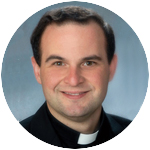
Father Eric J. Banecker
A few weeks ago, on my way to a meeting in Center City Philadelphia, I decided to take the SEPTA subway-surface trolley instead of driving. For the uninitiated, SEPTA is the shabby but efficient system of public transportation in Philadelphia. I took it partially because I hadn’t taken it in a few years, and also because, in addition to being environmentally friendly, it’s really convenient from where I live.
Upon arriving in Center City, I noted immediately the rise of publicly visible homeless people and encampments. I think when one drives, as I usually do in Center City these days, it’s easier to ignore. But walking around, I was able to take in the situation with fresh eyes.
At one point, walking down 17th Street, a man – I don’t think he was homeless but I’m not 100% sure – saw me walking in my clerical suit and said excitedly, “Hey Father! Man, I didn’t know they still had fathers!”
It was a moment at once moving and jarring.
[hotblock]
What is homelessness, after all? On the surface, it seems obvious: people need a place to live, a building with four walls and a roof, and some people don’t have it. And the reason for that, too, often seems obvious: these people are poor. They cannot afford decent housing, or at least housing in places where there isn’t a system of exploitation or in places where a person isn’t likely to get into trouble. I’ve learned some of this since arriving at St. Francis de Sales Parish and working with one or two homeless men.
But I’ve also learned that poverty isn’t the whole story. Don’t get me wrong, many of the people on the street are very poor and need financial assistance if they are to stop living on the street. But what goes hand-in-hand with this is a lack of social capital.
Many of the people on the street don’t have people in their lives that they can live with. In many cases, they are estranged from their families (often because of mistakes they themselves have made!). They may have a circle of friends, but these are often tenuous relationships without much trust. And so, they are exactly what the name suggests: without a home, without a physical or interpersonal place where they can feel safe, secure, and rooted.
And if that’s our working definition of homelessness, then we have to admit another truth: there are many people out there experiencing existential homelessness. That is, they may have an apartment or house where they sleep or (increasingly) work, but they lack many of those interpersonal connections which the people we traditionally call homeless also lack.
[tower]
Perhaps they live away from home and have family far away. Or maybe some sort of online activity has filled this existential need. But they’re still missing something essential to human flourishing, and they eventually begin to feel it.
The month of November begins with All Saints’ Day, in which we honor those who have made it home: the men and women of every time and place who have said yes to the God of Jesus Christ and who now live in his presence in a definitive and permanent way. Then we remember the holy souls in purgatory: those who rejoice that they have a home waiting for them in heaven, but who are still in need of purification and healing so that they can see God face-to-face.
This sets the tone for the rest of November, during which the readings and prayers, right up to the Feast of Christ the King and the beginning of Advent, call our attention back to the “four last things”: death, judgment, heaven, and hell. Those four things are all, in one way or another, about our permanent home.
After all, we have no lasting city in this world. We know that the Father desires all to be saved and come to the knowledge of the truth (cf. 1 Tim 2:4). Yet God loves us too much to force us to love him in return. We must choose freely to make our home with the one who made his home with us.
And in the end, I think that’s why the man’s seemingly random remark hit me. With so many people homeless in one way or another, priests – and faithful Catholics in general – need to be more present and visible. This is not so we can proclaim how wonderful we are, but to help people to see that there is a home for them in the household of God, which is the church. A home must have a father, of course, and priests have the remarkable privilege – flawed though we all are! – of representing our heavenly Father here in earth. Our very presence is a sign of hope in a world often bereft of it.
During this National Vocations Awareness Week (Nov. 7-13), that gentlemen’s comment encapsulates why we need priests today more than ever. During this month of November, it is a reminder that the road to our true home runs through the Body of Christ.
***
Father Eric J. Banecker is pastor of St. Francis de Sales Parish, Philadelphia.



Share this story